


Are you sure you want to reset the form?
Your mail has been sent successfully
Are you sure you want to remove the alert?
Your session is about to expire! You will be logged out in
Do you wish to stay logged in?
In March 1946 Winston Churchill addressed an American audience and called for greater Anglo-US relations, or a ‘special relationship’, in the fight against Soviet expansionism. This was not the first time Churchill had called for this; during the Second World War he had given a speech at Harvard University – after receiving an honorary degree – on Anglo-American unity, and he had continually referenced it throughout the war. Churchill also had a personal connection with America as his mother was the American-born socialite Jennie Jerome, who had married his father, Randolph Churchill, in 1874 and moved to Britain.
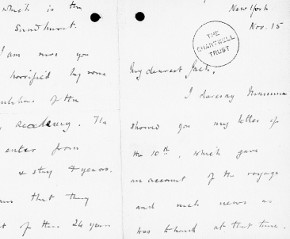
Churchill travelled to the US many times throughout his life, for personal and political reasons. In 1900, during his mid-twenties, he travelled to America to deliver a comprehensive lecture tour across the Eastern United States and Canada. However, this trip was not as lucrative as he had hoped. The American audiences had not responded enthusiastically, and some had been hostile towards him. Still, he was introduced to many elite members of American society during this period, including the current President of the US, William McKinley, and the next future president, Theodore Roosevelt.

Following his defeat in government in 1929, Churchill again crossed the Atlantic to lecture and promote his book, The Aftermath. Although this was not a political trip, he did make efforts to promote Anglo-US cooperation during this period, which included a brief visit to the White House to see President Herbert Hoover. He also experienced Prohibition first-hand – and was unimpressed – and witnessed the Wall Street Crash when he visited New York. Just two years later Churchill visited New York again but suffered a nearly catastrophic brush with death when he stepped into a road and was hit by a taxi driving around 30mph.
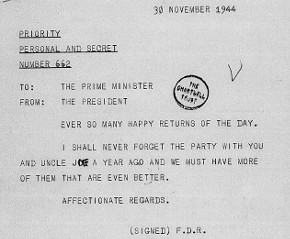
One of the key reasons for the strength of the special relationship in the Second World War was the close personal connection between Churchill and President Franklin Roosevelt. They have often been associated with the development of the Anglo-US special relationship, and it was during this period that the political relationship between the two countries thrived. The two leaders met in person eleven times throughout the war and exchanged over 1,700 letters and telegrams. Although they would not always agree, this close personal relationship provided the strong base on which the political one could endure.
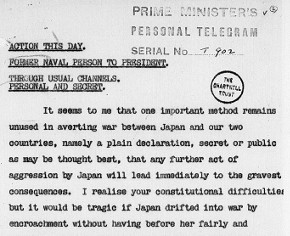
By 1941, much to Churchill’s disappointment, the US had still not officially entered the war. Instead they were content with providing support through initiatives such as the Lend-Lease Act. Yet after the devastation at Pearl Harbor on 7 December that year, the situation would vastly change. On hearing news of the attack, Churchill made his way immediately across the Atlantic, arriving in America in time to spend Christmas at the White House. Addressing US Congress for the first time on 26 December he passionately attempted to win support from them for his concept of the war.
The two countries worked together during the Second World War to execute significant operations, including the Normandy landings in June 1944. They shared military intelligence, military bases and even created a joint military command called the Combined Chiefs of Staff.
When Roosevelt died in April 1945, Churchill told the British Parliament that Roosevelt had been ‘the greatest American friend we have ever known, and the greatest champion of freedom who has ever brought help and comfort from the new world to the old’.
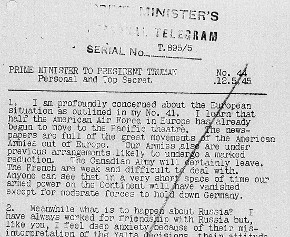
In November 1945, Churchill was invited by President Truman to deliver a lecture in Fulton, Missouri. The speech Churchill gave was one of the most influential he would deliver in his career and was entitled ‘The Sinews of Peace’, although it is more commonly remembered as the ‘Iron Curtain’ speech. Just one year after the Second World War had ended, Churchill warned of the iron curtain that was spreading over Europe, and called for greater cooperation between the US and UK, again referring to the ‘special relationship’. This speech was very influential and drew attention to the growing threat of a powerful Soviet Union and the potential for a ‘cold war’ between East and West.
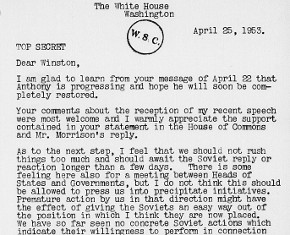
Churchill’s close relationship with presidents of the US continued in the years following this, and in 1954 President Dwight Eisenhower said that Churchill ‘comes closest to fulfilling the requirement of greatest of any individual that I have met in my lifetime’. Churchill visited the USA as a personal guest of Eisenhower at the age of eighty-four and was entertained at the White House. His final visit to the USA was in 1961, and he was offered the opportunity to be flown to Washington by President John F. Kennedy, yet his ‘weakened condition’ unfortunately did not allow this.
Despite many upper-class Britons having a superior attitude towards America in the early twentieth century, Churchill was deeply proud of his American heritage, and used his political power throughout his life to encourage a greater relationship between the two countries.